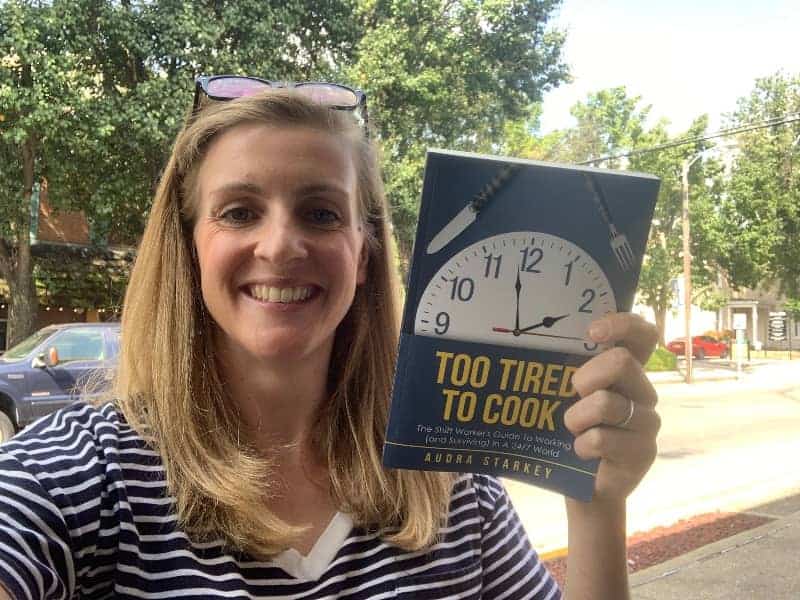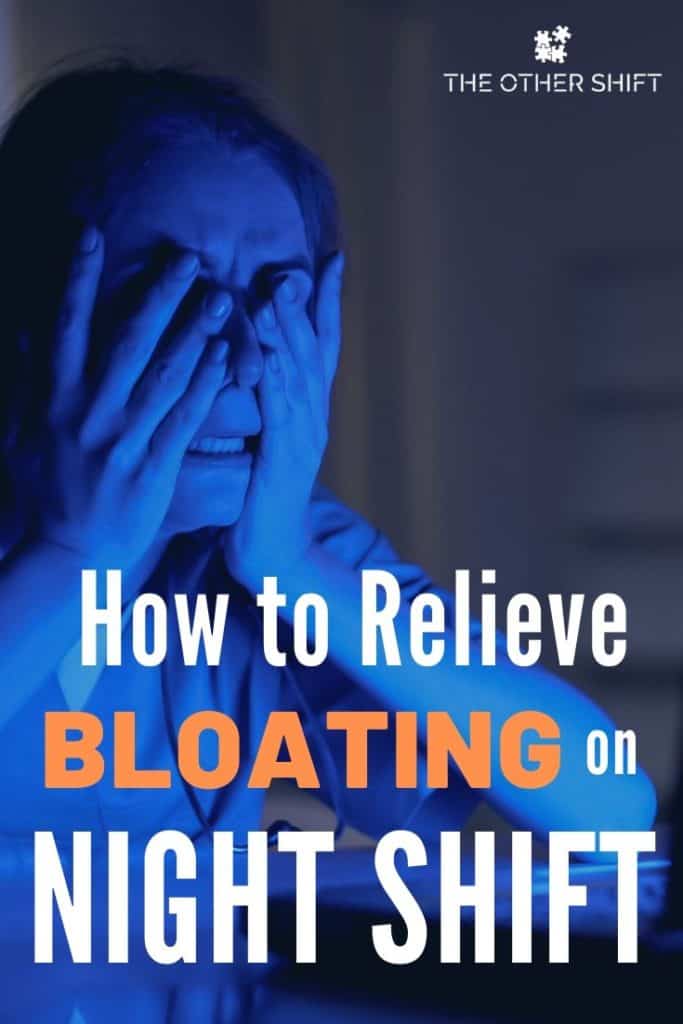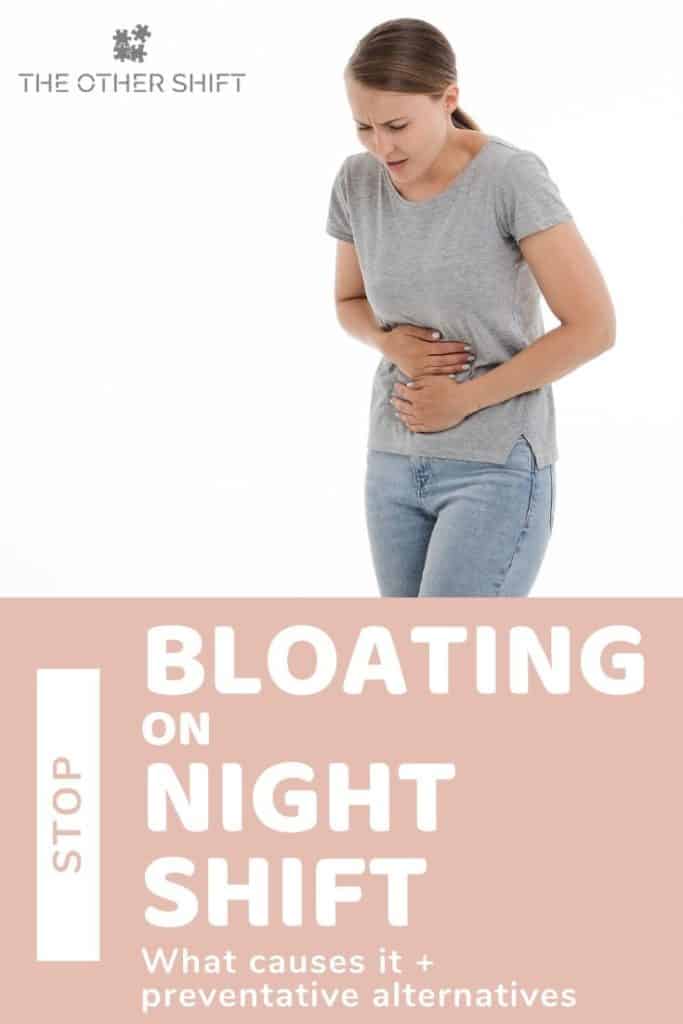Disclosure: This page may contain affiliate links, meaning we receive a commission if you decide to make a purchase through our links, but this is at no additional cost to you. Please read our disclosure and privacy statement for more info.
Does your work uniform become so unbelievably tight while on night shift that it looks like you’re pregnant? This could be due to excessive bloating. Let’s find out what causes this and how to fix it.
Bloating on night shift may occur due to dehydration, increased stress, overeating, consuming foods of intolerance or chronic gastrointestinal health problems. Choosing healthy, easily digestible foods over ones high in carbohydrates are more likely to prevent bloating and make you feel better working nights.
I recently listened to a fascinating podcast from the ultimatehealthpodcast.com about bloating. The hosts interviewed Dr. Robynne Chutkan, a keen and passionate medical practitioner who studies gut health. After listening for over an hour (click here to listen too or in the link below) and then comparing with other research studies, I wanted to share some key takeaway points specific to those of us working overnight.
What is bloating?
Bloating, “bloated belly” or a “bloated stomach” will be described differently from person to person, but it usually refers to “abdominal bloating, which is a distended belly often accompanied by burping (belching), gas (flatulence, farting), abdominal discomfort, and a feeling of fullness”. (source)
Most people will describe bloating as excessive gas and distention of the GI tract (digestive system)
The experts say it’s either too much…
- Air or gas in the digestive system/gastrointestinal or “GI track” (source)
- Liquid, often called “fluid retention.” This means too much liquid can be seen and/or felt after eating or drinking. Diets rich in salts such as pretzels, instant noodles and mixed nuts are common causes of fluid retention. Fun fact, women can also experience fluid retention or too much liquid before their period starts, causing bloating (source).
Or could also be…
- Something solid around the digestive system, such as a cyst, which is pressing on the bowel. This can cause a potential blockage pushing all the gas to “balloon up”.
- Something solid inside the digestive system such as feces/poo (constipation
 ). In this scenario, we basically have a hard time farting so the gas needs to go somewhere.
). In this scenario, we basically have a hard time farting so the gas needs to go somewhere.
- Potentially due to our digestive organs not working effectively such as the liver. (source)
- Underlying health conditions such as Irritable Bowel Syndrome (IBS), celiac disease, gluten or lactose sensitivity and reflux. (source)
What causes bloating specifically on night shift?
It comes down to a few things:
- We are eating at times when our digestive system is meant to be “sleeping”
- We are choosing foods that are hard for our body to digest overnight
- We crave “comfort food” and often use food as entertainment when we are bored
- We are choosing foods that we are “sensitive” or “intolerant” too which you may or may not be aware of
- Behavioral issues which are “self-sabotaging”
Let me explain each point further.
We are eating at times when our digestive system is meant to be “sleeping”
In the most simplistic of terms, when we eat on night shift we are doing so when our digestive system is supposed to be sleeping or at least resting.
What…sleeping!?
Yep! Our digestive system is controlled by the sun and likes to sleep when we should be. That’s when it’s dark outside, just like our 9-5 buddies.
It seems crazy I know, but our bodies circadian rhythm, as described by the Sleep Foundation is “your 24-hour internal clock that is running in the background of your brain and cycles between sleepiness and alertness at regular intervals. It’s also known as your sleep/wake cycle”.
Unfortunately for us working overnight, our digestive system is all part of this sleep/wake cycle. It likes to “sleep” when the moons out and starts again when the sun’s shinning the following day.
“Our digestive system rely’s on light and dark signals from the sun”
(source)
Therefore, food is taking A LOT longer to be digested when we eat overnight because your digestive system is in hibernation mode.
So does this mean we shouldn’t eat at all and try intermittent fasting?
While intermittent fasting is safe (we talk all about it here if you want to learn more) this is not the only way to work night shift.
We just need to choose foods that are easily digestible like soups, casseroles and smoothies to make the digestive process as simple as possible.

We are choosing foods which are hard for our body to digest overnight
Pizza, pasta, white bread and burgers from McDonald’s will look and smell amazing to some of you at 3am, but you won’t be doing your digestive system, nor your waistline any favors. (source)
But what’s the real issue with these foods, even in moderation overnight, with regards to bloating?
- High carb foods like these are difficult for your body to digest even during the day, but are made worse overnight as your digestive system is in go-slow mode. This can cause bloating and feeling like you’re in a “food coma” hindering working performance.
- Most are high in saturated fats putting extra stress on your heart. (source)
- The carbs from these foods are broken down into sugar causing a spike in your blood sugar levels. This may seem like a simple process but high blood sugar levels over a long period of time can have harmful effects on the body such as heart disease.
- They are high in calories making weight gain inevitable. For example, one slice of pepperoni pizza from Papa Johns is a whopping 320 calories! And who stops at just one slice?

We crave “comfort foods” and often use food as entertainment when we are bored
Do you eat when you’re bored overnight?
I don’t blame you at all. It’s easy to do and I’ve done it more times than I can count.
We crave unhealthy food and drinks for a quick sugar hit to keep us energized and stop feelings of fatigue taking over, right?
We know we should be eating almonds and fruit but we don’t want it because somewhere inside our tired brains we have convinced ourselves we need high carb foods more than high protein foods.
But why does this happen? Surely we are smarter than that?
Blame our appetite hormones leptin and ghrelin! These two hormones become really confused overnight primarily due to the light and dark signals but also do to our lack of sleep. (source)
We talk all about this in a video titled Are Night Shifts Bad For You? Stop Them Ruining Your Health
This was a really interesting video to put together and I encourage you to check it out, particularly if you want to avoid gaining weight overnight.
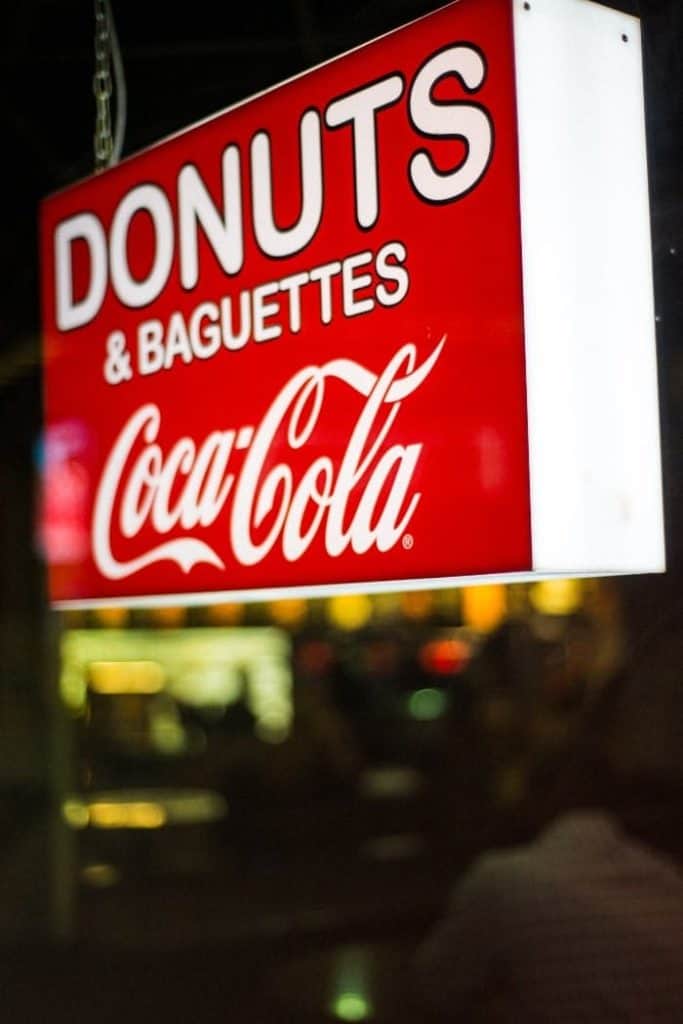
We are choosing foods which we are “sensitive” or “intolerant” too which you may or may not be aware of
Do you know which food and drinks make you feel excessively bloated overnight?
Maybe it’s the kale in your salad or the milk in your double shot latte?
Despite being limited for choice in the food department, we need to stay away from the food and drinks which have a negative impact on our tummy’s.
If you don’t know your “trigger foods”, it’s a good idea to start a food diary or have intolerance testing completed with a medical professional to work out a diet plan for the future.
This hardcover, food sensitivity journal from Amazon is a great place to start if you’re trying to work out the cause of your bloating. (#ad)
from Amazon is a great place to start if you’re trying to work out the cause of your bloating. (#ad)
“Keep a food diary to keep track of foods that affect you, and ask a dietitian or doctor if FODMAPs* might be to blame”.
Source *FODMAP”s – A technical acroym for carbohydrates that are poorly absorbed in the small intestine such as beans, falfals, aspargus and beetroom (see the whole list here).

Behavioral issues which are “self-sabotaging”
What about non-food related causes to night shift bloating?
My dad introduced me to the term “self-sabotaging” which I think is perfect in this scenario.
- Lying down for a nap on your break immediately after eating.
The food has no encouragement to move through your digestive system, essentially getting stuck.
The just “walk it off” quote can help the food be digested more easily overnight. See How to Survive Night Shift with a Desk Job for helpful tips on staying active.
We are all for timely naps on the night shift as we discuss in this post, but maybe consider napping before you eat?
- Stress
Does your tummy go into a complete spin when you’re nervous, anxious or stressed? Mine does.
According to Dr. Axe, stress impacts our digestive system in a BIG way but can be minimized by doing the things you love, even when working nights.
Incorporating regular date nights, consistent exercise, seeing your friends, meditating and doing the things you love will help reduce stress and therefore (hopefully) bloating overnight.
Related post: Shift Work Burnout: Causes, Red Flags and How to Beat It
The other causes are usually medication or infection-related
- Antibiotics
I had no idea that antibiotics can disrupt the environment in our digestive system so much!
Taking a 5-day course of an oral antibiotic can kill up to 1/3 of the good bacteria in the gut leaving it a patchy mess for years… scary. (source) Always ask your doctor if antibiotics are really necessary…
“…imbalances still present months and even years after a course of antibiotics”
NPS MedicineWise

- Leaky gut
In simple terms, it means the lining of your digestive system/ intestinal lining has been damaged.
Dr. Robynne Chutkan gave the analogy of a fishing net. Food moves in and out of the holes in the net (the digestive system) but in leaky gut the holes get larger meaning things can move into the body from the gut which are not supposed to, causing bloating.
- Anti-inflammatory medications (ibuprofen, neurofen) and steroids
- Parasites or other infections
Bottom line: If you take one thing away from reading this post it’s this…
To avoid bloating and nausea and remain in good health…
“While what we eat is important, when we eat or the time of digestion is critical (if not more so) for our well being” (source). Try and eat foods during your night shift which have minimal effect on your blood sugar, insulin levels and are easier to digest like soups, smoothies and bone broths.
The above quote is from my new favorite book “Too Tired to Cook” from the Healthy Shift Worker.
If you want to learn more about becoming a healthier shift worker you’ll want to buy this book. See it here on Amazon.com. (#ad)
How to stop bloating on night shift
Take a look at the table I have created below which identifies the potential causes of bloating on a night shift with some helpful alternatives and night shift hacks.
| Bloating causes: | Alternatives: |
| Eating too much – The size of our stomach is really only the size of your clenched fist and can expand 3-4 times its size during a meal. (source) | Chew slower and more often. Stop eating before you feel full. Try using a smaller plate/bowl /container. |
| Eating too fast – Accordind to MyoClinic, the faster you eat the more air you swallow | Slow down. Put down your silver/cutlery between each mouthful. Healthline recommends chewing 32 times for each mouthful! |
| Cruciferous veggies – cabbage, broccoli, kale (they contain fiber the digestive system cannot digest). | Avoid eating them raw. Steaming, boiling, cooking them or even soaking the night before can help eliminate gas. |
| High-fat foods like popcorn with plenty of butter, cream sauce and pizza take a lot longer to digest. | High protein snacks like almonds and hummus are a better choice. If you really like popcorn, eat it without butter and why not sprinkle balsamic vinegar / hot sauce or eat it with pickles or jalapeño peppers? |
| Artificial sugars and sweeteners – they can give you a lot of gas and are hard to digest. Interestingly, Sorbitol, an artificial sweetener, can’t be digested. (source) | Honey, maple syrup, coconut sugar and Stevia can help sweeten your meal. |
| Simple carbs like white bread, candy, pastries and soda | Eat complex carbs like whole grains, fruits and veggies as they take longer for your body to digest (try making a soup). But just keep in mind that oats, corn and gluten are hard to digest for some people particularly overnight. |
| Drinking soda through a straw. The bubbles in soda can get trapped in your digestive system. Burping helps but may not fully relieve the problem. (source) | Avoid drinking carbonated drinks overnight. We have a whole post here that gives you a ton of healthy alternatives. And don’t use a straw. |
| Dairy – it contains lactose and some people just can’t digest it very well. | Lactose-free milk, soy milk, almond milk or rice milk – just be aware they have less protein than cows milk. (source) |
| Salty diet | Put away the salt shaker and watch the sodium particaully in canned foods. Aim for less than 140 milligrams per serving of sodium. (source) |
| Fructose – It’s a kind of sugar that is often harder for your body to break down. It’s found in honey, onions, garlic and also some dried fruits. (source) | Try foods that have low fructose levels like bananas, blueberries, strawberries, carrots, avocados, green beans and lettuce or simply avoid it altogether. |
| Fermentable fruits like avocado, apples, peaches and stone fruit can be hard to digest leading to bloating. | Switch to bananas or even water-dense fruit to help keep you hydrated like watermelon, celery and strawberries. |
| Dehydration can worsen constipation and also make your organs work harder than they need to. | Herbal teas like freshly peeled ginger root, aloe vera juice, herbal teas can help ease digestion. But plain old iced water is the real hero for me. |

So should I see a doctor about my night shift bloating or can I wait and see?
I’m not a doctor so I can’t give personal advice, but during the podcast, Dr. Robynne Chutkan explained that being aware of the “red flags” is a clever and productive first step to ensuring you are maintaining good health.
Here are some of those important red flags to be aware of:
- Rapid weight loss or weight gain
- Bleeding from anywhere that’s not normal and you’re not expecting it (it could be red or dark)
- Increased lethargy and fatigue that feels really different from what’s normal for you
- Really bad tummy pain or discomfort
- Constipation. As described by WebMD, if you haven’t been for a few days, experience sudden constipation with pain or you can’t pass gas, it’s time to see your doctor.
If you are experiencing any of the following, make an appointment with your doctor and seek professional advice.
An interesting note from the interview was when you see your doctor complaining of excessive, severe bloating they will likely look at two options.
- What is the most lethal cause?
- What is the most likely cause?
“the majority of the things which cause bloating are not lethal.”
But most importantly, being aware of the “red flags” I mentioned earlier and seeking advice early is key.
Similarly, Dr. Axe, an online health expert said that “while a bloated stomach is certainly uncomfortable…it might be a bigger deal than you’d think.”
If something doesn’t feel right, take some personal leave and get checked out. Don’t work the next night shift or take medication like Beano, and just forget it’s happening.

Men vs Women Bloating
One look around my night shift staff room and you’ll see women talking about their bloating problems but very rarely the men. Why is that?
Women will experience bloating much more commonly than men
And there are three interesting reasons for this.
- Women’s colons are longer – about 10cm in fact.
- Women have a deeper, wider pelvis to accommodate for carrying and birthing a child. The longer colon “drops down” again as described by Dr. Robynne Chutkan, “competing for space” in the pelvic region. Men, on the other hand, have a bladder and a tiny prostate so there is lots of room when the stomach is full of food.
- Women have lower testosterone than men which results in a more floppy or less tight, if that sounds better, abdominal wall.
So girls, I know this may seem unfair, but we need to stop competing with our male co-workers and start to really think about our own health and how to meal prep while avoiding or trigger foods.
Related posts for the ladies:
- Does Shift Work Affect Your Period? Tips for Staying Regular
- Shift Work While Pregnant: Survival Tips from 46 Busy Moms
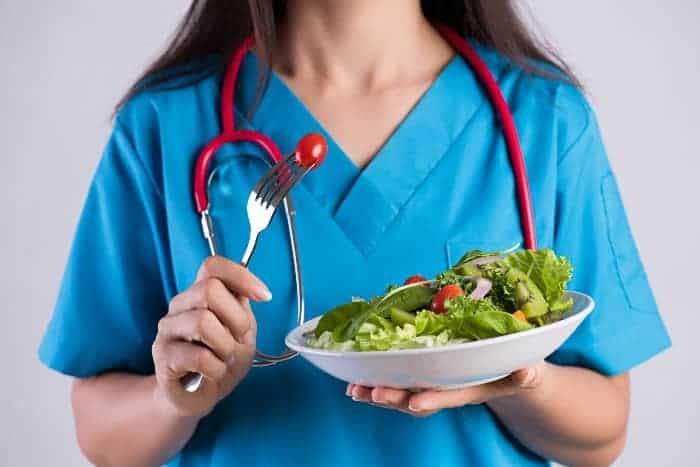
Bloating Resources:
Great, affordable books from Dr. Robynna Chutkan who specializes in gut health are available on Amazon.com (#ad).
- The Bloat Cure: 101 Natural Solutions for Real and Lasting Relief

- The Microbiome Solution: A Radical New Way to Heal Your Body from the Inside Out

- Gutbliss: A 10-Day Plan to Ban Bloat, Flush Toxins, and Dump Your Digestive Baggage

Keep Reading…
- Night shift nausea: What Causes Night Shift Nausea and How to Finally Beat It
- 3rd shifts: How to Handle Working Overnight. 9 Night Shift Tips and Tricks
- Naps: Should You Nap During Night Shift?
- Night shift tips: 7 Essential Night Shift Tips: Making the Impossible a Reality
Summary: Night shift bloating
To avoid feeling bloated overnight remember to focus on when you eat as well as what you eat.
If you’re not hungry, you don’t have to eat just because you’re bored. Expect your appetite hormones to send you mixed messages about your hunger levels, but stay strong to avoid not only bloating but also weight gain.
If you do get peckish, remember to choose easily digestible foods while on shift.
I hope you found this helpful.
P.s we have a range of products on our shift work tools page to help improve your health as a shift worker we encourage you to check out here.
Cheers,

Disclosure: This page may contain affiliate links, meaning we receive a commission if you decide to make a purchase through our links, but this is at no additional cost to you. Please read our disclosure and privacy statement for more info.


